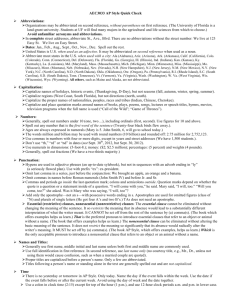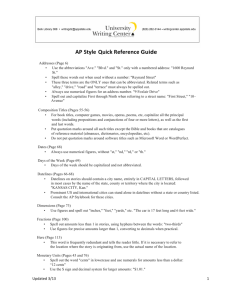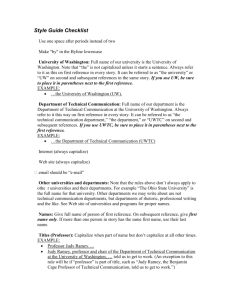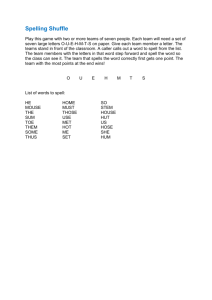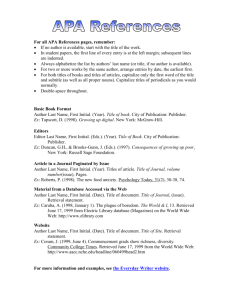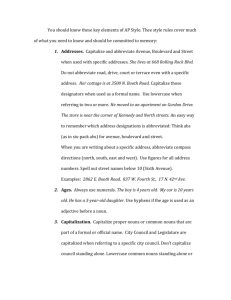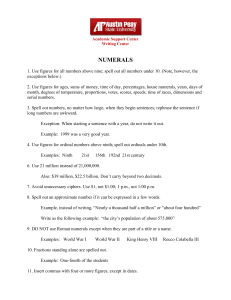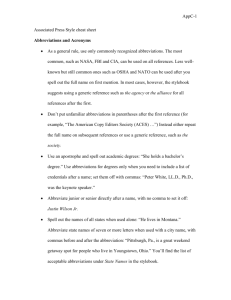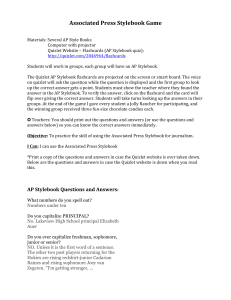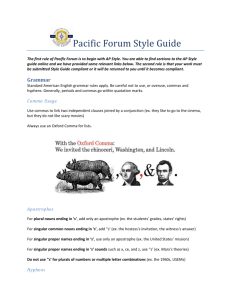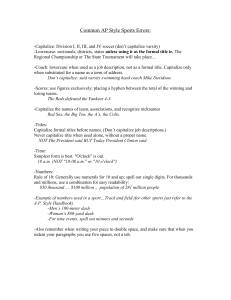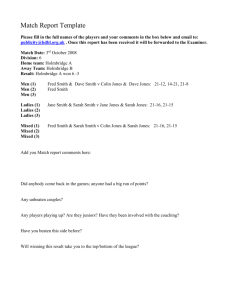AP Style Cheat Sheet for Student Journalists
advertisement
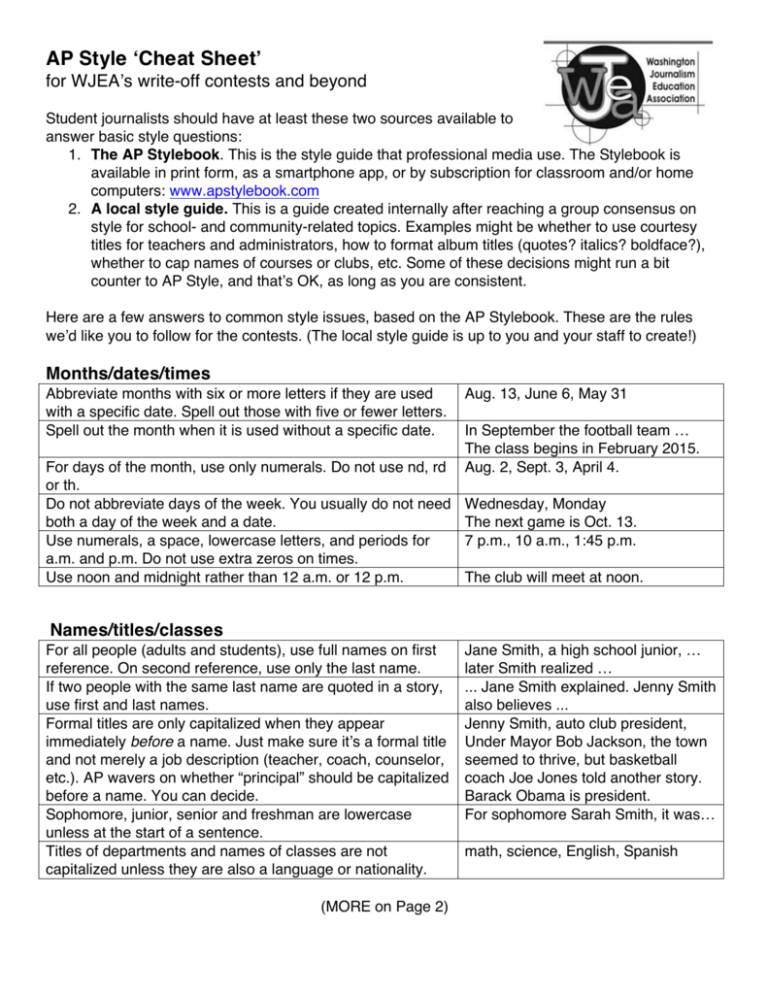
AP Style ‘Cheat Sheet’ for WJEA’s write-off contests and beyond Student journalists should have at least these two sources available to answer basic style questions: 1. The AP Stylebook. This is the style guide that professional media use. The Stylebook is available in print form, as a smartphone app, or by subscription for classroom and/or home computers: www.apstylebook.com 2. A local style guide. This is a guide created internally after reaching a group consensus on style for school- and community-related topics. Examples might be whether to use courtesy titles for teachers and administrators, how to format album titles (quotes? italics? boldface?), whether to cap names of courses or clubs, etc. Some of these decisions might run a bit counter to AP Style, and that’s OK, as long as you are consistent. Here are a few answers to common style issues, based on the AP Stylebook. These are the rules we’d like you to follow for the contests. (The local style guide is up to you and your staff to create!) Months/dates/times Abbreviate months with six or more letters if they are used with a specific date. Spell out those with five or fewer letters. Spell out the month when it is used without a specific date. For days of the month, use only numerals. Do not use nd, rd or th. Do not abbreviate days of the week. You usually do not need both a day of the week and a date. Use numerals, a space, lowercase letters, and periods for a.m. and p.m. Do not use extra zeros on times. Use noon and midnight rather than 12 a.m. or 12 p.m. Aug. 13, June 6, May 31 In September the football team … The class begins in February 2015. Aug. 2, Sept. 3, April 4. Wednesday, Monday The next game is Oct. 13. 7 p.m., 10 a.m., 1:45 p.m. The club will meet at noon. Names/titles/classes For all people (adults and students), use full names on first reference. On second reference, use only the last name. If two people with the same last name are quoted in a story, use first and last names. Formal titles are only capitalized when they appear immediately before a name. Just make sure it’s a formal title and not merely a job description (teacher, coach, counselor, etc.). AP wavers on whether “principal” should be capitalized before a name. You can decide. Sophomore, junior, senior and freshman are lowercase unless at the start of a sentence. Titles of departments and names of classes are not capitalized unless they are also a language or nationality. (MORE on Page 2) Jane Smith, a high school junior, … later Smith realized … ... Jane Smith explained. Jenny Smith also believes ... Jenny Smith, auto club president, Under Mayor Bob Jackson, the town seemed to thrive, but basketball coach Joe Jones told another story. Barack Obama is president. For sophomore Sarah Smith, it was… math, science, English, Spanish Numbers/money In most usage, spell out numbers under 10. Exceptions beyond dates and times shown above: • Addresses: 6 Maple St. • Ages, even for inanimate objects: Beth, a 15-year-old; the 2-year-old building • Dollars and cents: $5; 5 cents. • Measurements (such as dimensions and speed): 6 feet tall, 9-by-12 rug; 7 miles per hour • Temperature: 8 degrees • Millions, billions: 3 million people • Percentages: 4 percent (and spell out “percent”) Spell out any number that appears at the beginning of a sentence. The one exception to this rule is a year: 1981 was the last time the high school won a state title. Do not spell out monetary amounts or use extra zeros: $6 or $2.30, but NOT $6.00 or six dollars. Sports Do not capitalize names of sports, their competitive level (varsity, junior varsity, etc.) or specific positions. When referring to a gender-specific sport, note the placement of the apostrophe in the possessive. varsity basketball; quarterback Note that “team” and the name of the school are singular nouns; but the school’s mascot is generally plural. Use numerals for records and scores but not necessarily points. Garfield scores three points; the Bulldogs score three points The team, now 7-3, won 51-48 after scoring three points in the final six seconds. The team was No. 1 (NOT number one); No. 1 Garfield beat No. 6 Roosevelt; first-place team Note unusual style for rankings. girls’ field hockey Punctuation/abbreviations/quotes Apostrophes usually show possession, so usually you shouldn’t use them to make acronyms and numbers plural. An exception is with individual letters such as in grading. Not all cities need a state name with them, but those that do should NOT get a postal code but rather AP abbreviations (see Stylebook). Place quotation marks around almost all composition titles, but not reference, newspaper or magazine names. Capitalize the first letter of a full-sentence quote. When a full-sentence quotation is introduced or followed by attribution, place a comma between them, unless the quote is a question. When using a sentence fragment as a quotation, do not set it off with a comma unless the sentence requires one for proper grammar. Do not capitalize the first letter of a sentence fragment quote. 1970s; ABCs; she received six 4s; she received six A’s. Seattle; Bellevue, Wash.; Portland, Ore. (NOT WA or OR) “American Idol”; “Born This Way”; Time magazine Jones said, “All of us were excited.” “All of us were excited,” Jones said. “Were we all excited?” Jones asked. Jones told the crowd to “get pumped up” about the pep rally.
